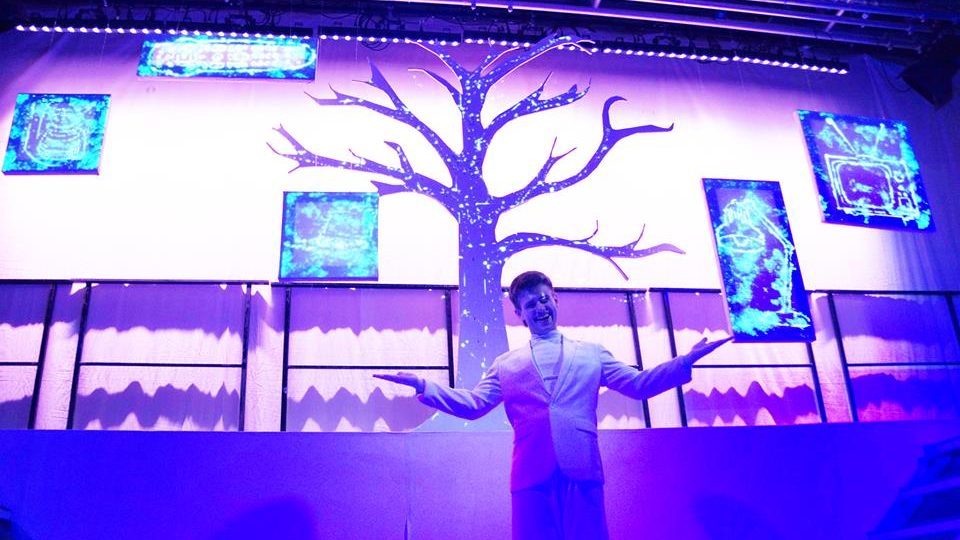‘Community, identity, stability.’ This is the motto of the dystopian London conceived by Aldous Huxley in his 1931 novel Brave New World. It is with an emphasis on this dogma that the audience is introduced to Four Seven Two’s production of the novel, adapted for the stage by Miranda Mackay.
Six hundred years in the future, London is a city that has been transformed as part of the totalitarian ‘World State.’ In the quest for ‘civilisation,’ the State’s authorities monitor a strict regime in which its citizens are genetically engineered and kept ‘happy’ through a regular dosage of the euphoria-inducing drug, soma. For a world that sounds like nothing could go wrong, the resulting atmosphere is suffocating, with happiness proving unrelenting. Any diversity of feeling is considered unnatural.
The plot focuses on two contrasting citizens: the popular Lenina Crowe (Amelia Holt), an ideal example of the regime; and Bernard Marx (Patrick Orme), an outsider who is defined by his dissatisfaction with the seemingly perfect world he inhabits. The two are brought together by a shared sense of curiosity and a visit to the ‘Savage Reserve,’ populated by the ‘uncivilized’ humans who remain tied to the human traditions of religion and history, brings the pair in contact with Shakespeare-reciting savage, John (Lucy Miles). John is unusual in that he was born to World State parents – his mother, Linda (Esme Sanders), having been lost in a storm during a trip to the savage reserve years earlier. John and Linda’s eventual return to the city of London allows for Huxley to juxtapose human consciousness across these parallel worlds, which forces the audience to question which is better: to live in a world of constant happiness where your identity is chosen for you; or the ability to experience a world of complexity where one must experience the plethora of human emotion, including immense pain and suffering? The critical choice put to us is between stability and feeling – as the Director (Marcus Knight-Adams) remarks of the savages in the introductory scene, ‘they felt strongly, and feeling strongly, how could they be stable?’
For this production at the Keble O’Reilly, the audience are thrown into the workings of the World State with a vigour that leaves no audience member falling to the wayside. This was aided by a very well executed technical design that proved near hypnotic. It is evident that director Georgie Botham, a self-confessed Berkoff enthusiast, has a definite clarity of vision for this production. The ensemble erupt onto the stage as the play begins, bringing with them a heightened physical and visual presence that is simply a joy to watch.
What makes Botham’s approach so appropriate when embodying the story of Huxley’s novel for stage is her ability to highlight the dichotomy of the individual and the collective – a dichotomy that feels as much a problem of the human existence now as it would have done to Huxley in 1931. This dichotomy is made immediate through a constant back and forth between tight choral work by the ensemble, and the heightened exploration of relationships between individuals. The overwhelming power of the collective is also emphasised by vocal layering, with the recurring motif of laughter communicating the constant anxieties of societal judgement characteristic of the World State.
A production with such an emphasis on stylised characterisation and choral movement demands discipline and commitment on the part of actors. This production did not disappoint – far from it. Performances across the board were met with considered detail and embodied with a level of control that I think is rarely found on the student stage. In particular, Marcus Knight-Adams was a delight to watch – so much so that a brief cameo he had as a seagull meant I was momentarily stolen away by intense laughter. Knight-Adams, as administrator of the Central London Hatchery and Conditioning Centre, i.e. the birthplace of ‘civilised’ humans in London, brought to the role such heightened physical consistency that meant that, toward the end of the play when he engages in a debate with the savage John, a momentary flicker of human vulnerability felt particularly poignant.
This scene between John and the Director was a highlight for me, as the two (who oddly happen to be father and son) clash over whose world is better for humanity. The scene ends with John insisting that he is ‘claiming the right to be unhappy.’ As John, Lucy Miles demanded audience attention at all times, and spoke with commendable diction appropriate for the eloquence of Miranda Mackay’s script.
Although this production was executed pretty phenomenally, the only thing I could say was that there were times where ensemble members could afford to go even further with characterisation and physicality. Certain members of the ensemble, particularly Esme Sanders, achieved such impressive contortions of the face and body that in an odd way she stuck out. Whilst of course I do take into account first night nerves, I would encourage all members of the ensemble to push it to that level, and I believe the result could be even more effective.
I would urge Oxford’s theatre-lovers to head to the Keble O’Reilly to see this frankly brilliant production.



